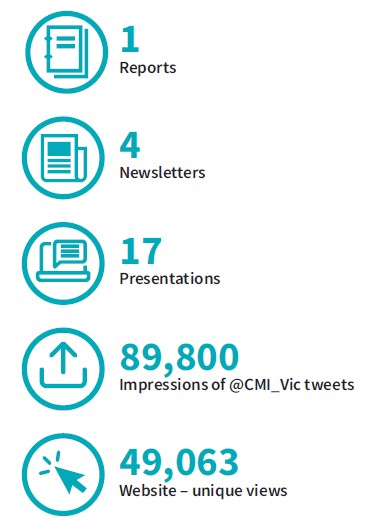We use a range of communication tools to provide guidance to the local government sector and education to the general community. We publish reports, newsletters, presentations, social media posts, and fact sheets and use our website to provide this information.
We also engage with the Victorian Government, councils, council representative bodies, the community and other stakeholders through other channels, such as speaking engagements, presentations and meetings.
General engagement
The travel restrictions which were in place in the state due to COVID-19 continued to impact on our face-to-face engagement in 2021–22. When our movement was restricted, we made use of online tools to present to councils across Melbourne and Victoria.
We presented to councillors and governance staff at councils including Nillumbik, Wodonga and Murrindindi, and to online audiences at sector representative bodies such the Victorian Local Governance Association, Municipal Association of Victoria and the Western Australian Department of Local Government, Sport and Cultural Industries.
However, once travel restrictions were relaxed, we headed out to speak to councils to conduct in-person interviews and collect information for investigations. Once we were able to travel, we also visited rural and regional councils including Warrnambool, Mildura, Gannawarra, Yarriambiack and West Wimmera. We also presented to councillors from Greater Shepparton in person.
Address at major councillor conference
In June 2022, the Inspectorate addressed the Victorian Branch of the Australian Local Government Women’s Association (ALGWA) conference. The annual conference, held in Shepparton, attracted about 150 people and is one of the largest gatherings of local government in Victoria.
Mr Stefanovic and Senior Investigator Laura Majewski spoke about our work in promoting integrity, including case studies about conflict of interest and how councils have managed the issue of councillor interference in operational matters.
The conference was an opportunity for councillors and staff to speak to us about issues they face and seek our advice. It was also a chance for us to better understand the challenges and opportunities facing the local government sector in 2022.
We also offered councillors and council staff copies of our new fact sheets, reports and report summaries.
Newsletter
The Inspectorate published four newsletters to provide information and updates about significant reports, investigations, events and other relevant information.
Newsletters were sent to more than 3,540 subscribers and published on the Inspectorate website. The content was a mix of information about our work and guidance to councils and councillors to improve the understanding of and compliance with the Act.
Resources for councils
The Inspectorate produced a wide range of fact sheetsin 2021–22 to simply explain the complex processes and legislation. The fact sheets aim to help council staff, such as governance officers, with straight-forward information on topics, including:
- when personal interest disclosure need to be made
- which integrity agency handles specific types of complaints
- what comprises a conflict of interest under the Act.
We also produced short, easy-to-read summaries of our governance and investigation reports.
These publications were produced to answer questions we are often asked and to assist complainants, councils and the community to better understand our work and key aspects of legislation.
Social media
The Inspectorate uses its Twitter and LinkedIn accounts to provide updates on its work and highlight key issues for the sector.
We saw a modest increase in queries directed to our @CMI_Vic Twitter account about election campaigning practices, councillor or candidate behaviour or council activities.
Website
The Inspectorate website provides information about the Inspectorate, our powers and our work. We also publish guidance and education material to improve understanding of and compliance with the Local Government Act.
The website contains our reports, media releases, newsletters and the secure online complaint form.
Website changes to improve accessibility
In December 2021, we rolled out changes to our website to improve accessibility.
The project to refresh the web content started by analysing visitors to our website to better understand the reason they were visiting our site and the type of information they were after.
As a result, we developed more content to help users understand what complaints we can assess and to help them reach the appropriate bodies when complaints are outside our jurisdiction.
We also developed a section to provide councils and governance staff with guidance to improve compliance with the Local Government Act. This section of the website contains case studies of investigations and common governance issues. We published summaries of reports which are easier to access than the full document.
We also produced a number of fact sheets targeting councillors, which are aimed at improving understanding of and compliance with the Act.
Updated


